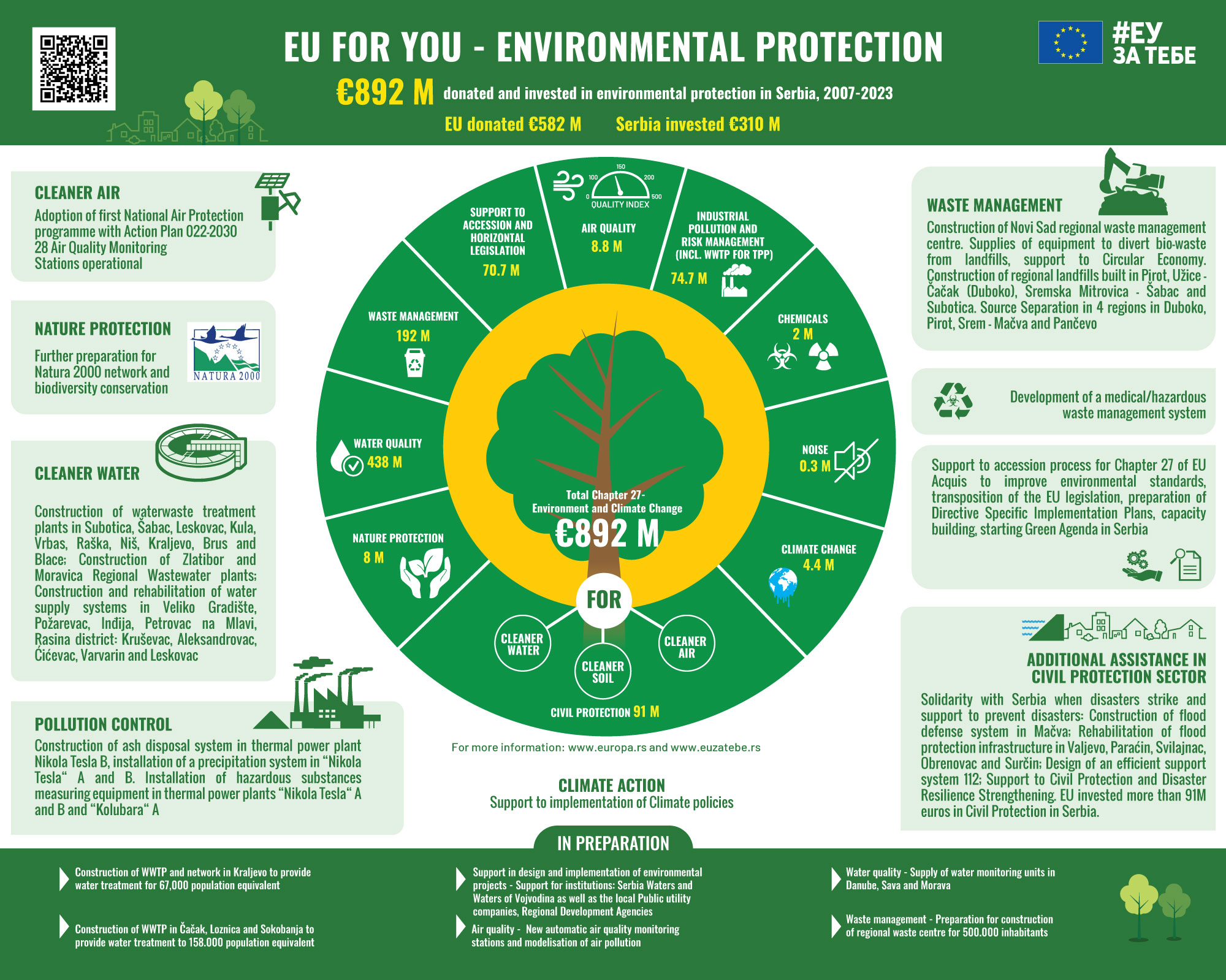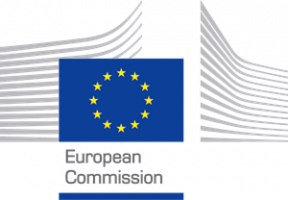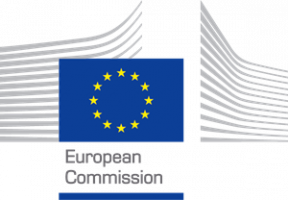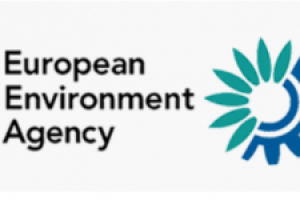About Sector
Serbia
applied for EU membership in December 2009 and was granted EU candidate status in March 2012. The EU-Serbia
accession negotiations began in January 2014. So far, 22 out of 35 negotiation
chapters have been opened. Chapter 27 – Environment and
Climate was opened in December 2021.
The EU is helping Serbia during this process to be prepared for accession date in several chapters of the EU acquis, in particular for Chapter 27 – Environment and Climate, which requires strong institutions, involves complex legal obligations, requires skilled staff, financing mechanisms in place, monitoring, etc.

The EU
supports Serbia to achieve its own goals with regard to environmental
protection and climate action to raise them
gradually to EU-level standards, while improving awareness
of citizens, private sector and media.
The EU works in a Team Europe spirit with EU member States present in Serbia, with
international organisations, with civil society organizations, and with private
companies, pushing innovation.
The EU has so far invested over 582 million EUR in protecting Serbian environment for direct interest of Serbian citizens, with Serbia investing around 310
million EUR, for a total of 890 million EUR. More support is made available
through the Western Balkans Investment Framework: 53 million EUR in grants
generating around 50 million EUR of loans.
Serbia’s
commitment to adhering to EU environment and climate goals is essential for the country’s
integration path and will help Serbia to make a more
efficient use of resources.
Moving to clean, circular economy and taking
actions to stop climate change, while recovering biodiversity loss and reducing
pollution, will support people to access clean air, clean water, improve the economy and create new jobs.
The most important results of EU support to
Serbia include building a network of air quality measuring stations, building wastewater treatment plants in Subotica,
Šabac, Leskovac, Kula, Vrbas,
Raška, Niš, Kraljevo, Brus and Blace. It also includes the restoration of water supply systems in
Požarevac, Inđija, and Petrovac na Mlavi. In Veliko Gradište, where the water
supply system was built from the ground up. The EU financed an ash disposal
system and filtration system installations at the Nikola Tesla Thermal Power
Plant (TENT). Also, the equipment for the monitoring of emission of harmful
substances was installed at TENT A and B and at Kolubara Thermal Power Plant A.
Regional landfills were built in Pirot, Užice, Sremska Mitrovica, Šabac, and
Subotica. The medical waste management system has also been developed. The very
first regional sanitary landfill in Duboko opened thanks to EU assistance now
serves nine municipalities in Western Serbia, receiving 80,000 tonnes of waste
annually. The EU also funded a flood defence system in Šabac with 10 million
EUR. In Subotica, the EU funded the construction of a modern Regional Waste
Management Centre with 20.3 million EUR.
With the ODVAJAMO
project Serbia, EU and Sweden have thoroughly prepared the introduction of
recycling in 17 municipalities. It has been done through a participatory
approach: the ownership of the project lies with the local authorities and
depends on the participation of citizens. The project is providing training,
communication, trucks, and bins, but the real work will be done by municipality
and citizens! Concrete results: in the month of April 2023, after only 6 months
of implementation more than 650 tons of waste were collected for recycling. No
special fees were introduced, but a functioning system and engaged
municipalities and citizens.
The Green Agenda for the Western Balkans is
the growth strategy for the region
aiming to tackle the challenges of
climate change and green transition and assist the Western Balkan (WB)
countries to align environmental
regulations with the European acquis. The Green Agenda for the WB is
based on the European Green Deal and the Economic and Investment Plan for the
WB. The “EU for Green Agenda in Serbia”
initiative was launched in 2021 by the EU
Delegation and Ministry of Environmental Protection of Serbia. Its objective is to contribute to the efficient, inclusive
and sustainable implementation of the Green Agenda for the Western Balkans and
its Action Plan, by building broad
engagement and societal participation. This will be achieved through (1) policy support and capacity
building, (2) piloting actions to
support green transition and (3) scaling
up of successful investments. “EU for Green Agenda in Serbia”
platform is implemented by UNDP, in cooperation with the Embassy of Sweden and
the European Investment Bank (EIB) with additional funding from the Governments of Sweden, Switzerland and
Serbia. More partners have expressed
their desire to join the platform. This is EU cooperation maximizing support to
benefit of all citizens.
All of this
has helped to improve the lives of hundreds of thousands of Serbian citizens.
The emission of particulate matter into the
air above Obrenovac and its surroundings has been reduced by as many as six
times. Existing ash transport and disposal facilities at TENT were also
modernised, reducing the use of coal. The EU also funded the purchase and
installation of 28 measuring stations and the procurement of measuring
instruments for automatic monitoring of air quality. By setting aside 2 million
EUR for the procurement of lab equipment, instruments, and high-tech devices
for water quality analysis, the EU helped to promote the work of the National
Laboratory for Water, Air and Soil Analysis.
The EU is also working to raise
environmental awareness and promote action in the society as a whole.
Nation-wide campaign “Look around—Let’s Move”; Climate Day at Ada Lake; tree
planting campaign spearheaded with EXIT Foundation; support for “Climate
Caravan” and GreenFest festival; participation in several public discussions
and debates; this is a fraction of EU’s efforts to raise awareness among
citizens so that they, too, can become agents of change at both personal and
collective level. The EU shows that even small things like carrying a bag to
the store instead of buying another one made of plastic or using public
transport and bicycles instead of cars—coupled with in-depth reform—can indeed
make a huge difference.
Serbia’s biodiversity and habitats are unique in
Europe and are home to a large number of endangered species. The EU supports
the protection of biodiversity through its Natura 2000 support. In Srpski Krstur near Subotica dwells the last
pair of eastern imperial eagles, the bird depicted on the coat of arms
of the Republic of Serbia. The population of this remarkable species is now
three times greater and is on the path to recovery, thanks in part to EU
support for the nature sector which has so far reached over 4 million EUR.
In
February 2020, when air pollution in Serbia stood above permitted limits for
days, the EU supported Serbia to take action and tackle the issue in an effort
to prove how the process of EU integration can be helpful by offering
expertise, examples of good practice, and investment.
In
areas affected during the floods in 2014, the European Union invested more than
EUR 160 million in grants, building houses and repairing destroyed
infrastructure.
Together, the EU and Serbia raise awareness about
environmental protection and encourage citizens to take action. The EU supports
Serbia to achieve common goals: pollution reduction, clean energy, biodiversity
recovery, smart mobility solutions, energy efficiency, transition to clean
energy, circular economy, reduction of the use of natural resources, recycling,
introduction of innovative green technologies, protection of endangered plant
and animal species, etc.
The EU helps Serbia create policies, initiates
legislation reform, and builds capacity with over 72 million EUR allocated so far and more to come. The
Government of the Republic of Serbia, together with the European Union, is
working to harmonise legislation and create the framework for sustainable
development and efficient use of natural resources, reduction of carbon
dioxide, eradication of harmful and wasteful behaviour, and protection of the
environment for current and future generations. With EU’s support, Serbia is
working to improve the quality of life of its citizens, ensuring that laws and
policies strive for clean air, water, and soil.
The EU is the smart engine of environmental
protection worldwide. Within the
European Green Deal, which aims to make Europe the first climate-neutral
continent by 2050, a roadmap with actions is set out in the fields of climate,
clean energy, circular economy, construction, mobility, agriculture,
sustainable food chains, biodiversity and de-pollution. The engagement of
Serbia in adhering to these goals is essential for Serbia’s integration path
and will help to strengthen efficient use of resources. Moving to clean,
circular economy and taking actions to stop climate change, while recovering
biodiversity loss and reducing pollution, will support the economy and create
new jobs.
In the last 12 years, Serbia received over 8 billion EUR in
financial assistance from the EU’s budget only, including 3.3 billion EUR in
non-refundable grants, making the EU by far the biggest donor in Serbia.

List of key local partners/organisations
- Ministry of European Integration
- Ministry of finance
- Ministry for Environmental Protection
- Ministry of Mining and Energy
- Ministry of Agriculture, Forestry and Water Management
- Ministry of Construction, Transport and Infrastructure
- Public Investment Management Office
- Republic Geodetic Authority
Flagship Projects
EU for Greeen Agenda in Serbia
The European Union is the world leader in environmental protection. The EU supports Serbia on its path to a healthier environment. With over 582 million EUR in non-refundable grants invested in environmental protection and climate action in Serbia, the EU is the largest donor in this area in the country.
With EU's financial support, Serbia is working to develop and implement plans for the strategic protection of environment—a sustainable system of environmental protection that creates healthier surroundings and raises the quality of life.



